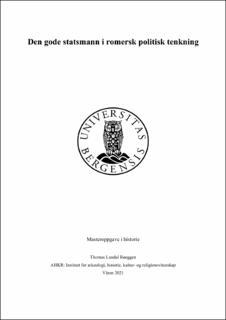Den gode statsmann i romersk politisk tenkning
Master thesis
Permanent lenke
https://hdl.handle.net/11250/2761437Utgivelsesdato
2021-06-02Metadata
Vis full innførselSamlinger
- Master theses [241]
Sammendrag
In this thesis I trace the political concept of the “the good statesman” through the transitional period between the late Roman Republic and the early Roman Principate. I focus primarily on four political writers – Cicero and Sallust in the Republican period, Seneca and Tacitus during the Principate – and I aim to situate their thinking about the good statesman within the context of their general political thought, and the broader context of Roman political and social life. One of the main conclusions I arrive at in this thesis is that the very mode of discussion flips during the Principate, by assuming a negative form. Here, the discussion of the good statesman no longer aims at a positive good, like individual or collective gloria. Rather, the mode of discussion assumes a new premise, namely that the statesman ought to be guided away from something – this could be misuse of his political powers, or something specified in greater detail by the relevant author. I explain this phenomenon both by pointing to the structural changes that occurred when the emperors seized political control over Rome, as well as the very arbitrariness of the emperor’s powers. This thesis also demonstrates that several Roman authors participate in rich and nuanced philosophical traditions of discourse – both Roman and Greek. However, they also share a suspicious attitude towards the scale of values which they ascribe to Greek thinkers. In this case, the Romans clearly want to distance themselves from the Greek philosophical tradition, in which the philosophical life (or the “contemplative life”, as put forth by Aristotle) takes precedence over the political life. This can also offer an explanation as to why the discussion of the good statesman in its Roman setting – based on the selected source material I will discuss here – never loses contact with practical life. Rather, the discussion takes the form of a direct response to concrete political challenges and goals.
